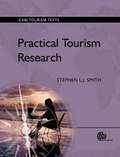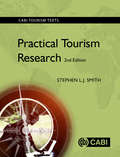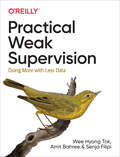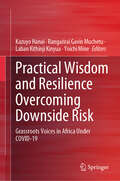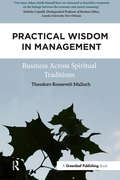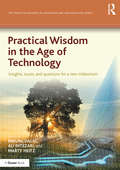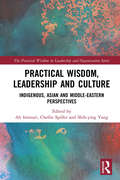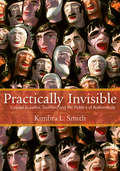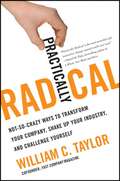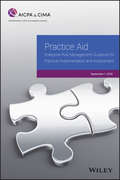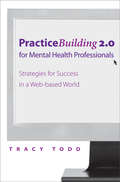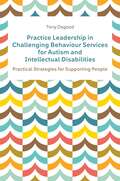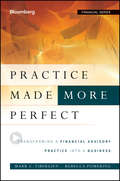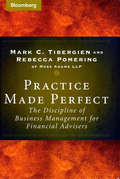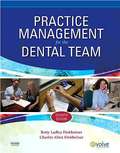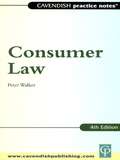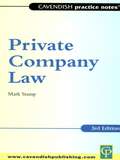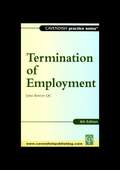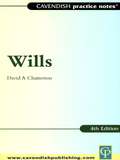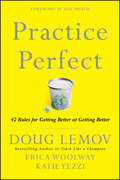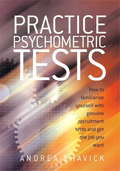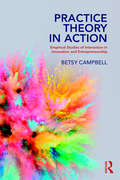- Table View
- List View
Practical Tourism Research
by Stephen SmithTraining in research methods is increasingly important for students of tourism, and this broad, accessible textbook outlines the concepts and tools essential to understand, manage, and conduct research. The book also provides practical advice on tasks from planning to reporting the results of a research project. Skills such as questionnaire design, sample selection, and interviewing are covered, as well as analytical tools such as the development of scales and indices, assessment of advertising performance, benchmarking, market segmentation, case studies, and content and visual analysis. Drawing on the author's extensive experience in tourism research, this practical text is an essential resource for students of tourism research as well as tourism consultants and managers.
Practical Tourism Research (CABI Tourism Texts)
by Stephen SmithTraining in research methods is increasingly important for students of tourism, and this broad, accessible textbook outlines the concepts and tools essential to understand, manage, and conduct research. Taking a practical approach throughout, this new edition provides advice on the use and cautions associated with some of the more common research designs and tools used by tourism researchers. Fully updated throughout, it: - covers core techniques such as questionnaire design, sample selection, and interviewing - reviews analytical tools such as the development of scales and indices, assessment of advertising performance, benchmarking, market segmentation, case studies, and content and visual analysis. - uses recent real-world examples and focus boxes throughout to assess new aspects of research such as blogs, narrative analysis and Geographic Information Systems (GIS) - retains the approachable, personal writing style of the previous edition. Also including an increased use of handy pedagogical features to aid learning, this new edition is an essential overview for undergraduate and postgraduate students of tourism research, as well as a useful resource for researchers, consultants and managers.
Practical Tourism Research 2nd Edition
by Stephen L.J. SmithTraining in research methods is increasingly important for students of tourism, and this broad, accessible textbook outlines the concepts and tools essential to understanding, managing, and conducting research. Taking a practical approach throughout, this new edition provides advice on the use and cautions associated with some of the more common research designs and tools used by tourism researchers. Fully updated throughout, it: - covers core techniques such as questionnaire design, sample selection, and interviewing - reviews analytical tools such as the development of scales and indices, assessment of advertising performance, benchmarking, market segmentation, case studies, and content and visual analysis. - uses recent, real-world examples and focus boxes throughout to assess new aspects of research such as blogs, narrative analysis, and Geographic Information Systems (GIS) - retains the approachable, personal writing style of the previous edition. Incorporating an increased use of handy, pedagogical features to aid learning, this new edition is an essential overview for undergraduate and postgraduate students of tourism research, as well as a useful resource for researchers, consultants, and managers.
Practical Weak Supervision: Doing More with Less Data
by Wee Hyong Tok Amit Bahree Senja FilipiMost data scientists and engineers today rely on quality labeled data to train machine learning models. But building a training set manually is time-consuming and expensive, leaving many companies with unfinished ML projects. There's a more practical approach. In this book, Wee Hyong Tok, Amit Bahree, and Senja Filipi show you how to create products using weakly supervised learning models.You'll learn how to build natural language processing and computer vision projects using weakly labeled datasets from Snorkel, a spin-off from the Stanford AI Lab. Because so many companies have pursued ML projects that never go beyond their labs, this book also provides a guide on how to ship the deep learning models you build.Get up to speed on the field of weak supervision, including ways to use it as part of the data science processUse Snorkel AI for weak supervision and data programmingGet code examples for using Snorkel to label text and image datasetsUse a weakly labeled dataset for text and image classificationLearn practical considerations for using Snorkel with large datasets and using Spark clusters to scale labeling
Practical Wisdom and Resilience Overcoming Downside Risk: Grassroots Voices in Africa Under COVID-19
by Yoichi Mine Kazuyo Hanai Rangarirai Gavin Muchetu Laban Kithinji KinyuaThis book classifies and assesses the real and perceived risks associated with both the Covid-19 pandemic and government responses to it in seven African countries — DR Congo, Kenya, Ethiopia, South Africa, Tanzania, Uganda, and Zimbabwe — based on large scale quantitative and qualitative surveys conducted in 2022–2024. It also elucidates the people&’s resilience in overcoming the risks within their political, social, and cultural context. Although research on COVID-19 has been conducted in various fields, particularly in the medical field, the analytical perspective of this book is unique. COVID-19 prevention policies are considered to have seriously increased other risks, such as hunger, other infectious diseases, interruption of education, and various types of human rights violations, including increased conflict, violence against civilians, and political abuse. Therefore, this book argues that COVID-19 prevention policies, as well as the pandemic itself, should be regarded as the downside risk that triggers the deterioration of the other potential risks to vulnerable people. Depicted here is the account of how trust in government, community, and family, within the existing political, social, and cultural environment, created pandemic politics, as elections during the pandemic instrumentalized and politicized government prevention measures. Economic distress threatened people's lives more than COVID-19 during lockdowns and severe behavioral restrictions, and the spread of misinformation discouraged people from being vaccinated. This book will be useful to policy makers and practitioners in international society who are preparing for the next pandemic based on the lessons learned from the COVID-19 pandemic.
Practical Wisdom in Management: Business Across Spiritual Traditions
by Theodore Roosevelt MallochPractical Wisdom in Management is the first in-depth case-study book to explore how practical wisdom from spiritual and philosophical traditions inspires corporate culture and leadership. The outcome of the Practical Wisdom Initiative, between The Academy of Business in Society (ABIS) and Yale University Center for Faith and Culture, it seeks to construct a bridge between the worlds of management and the spiritual and philosophical traditions.Covering ten major worldwide religions, Theodore Malloch provides an overview of the practical wisdom of the major faith traditions for management. It includes case studies of over twenty multinational corporations focusing on their values, spiritual inspiration and business strategy. It features case studies on corporations including:Ascension Health; Michelin; DANONE Group, Walmart; TOMS; Marriott; HSBC; Four Seasons; Guangzhou Eversunny Trading and Toyota. It is essential reading for business leaders, researchers and students of business ethics and spirituality courses and includes full teaching guidance.
Practical Wisdom in the Age of Technology: Insights, issues, and questions for a new millennium (The Practical Wisdom in Leadership and Organization Series #2)
by Ali Intezari Nikunj Dalal Marty HeitzThe dramatic recent advances and emergent trends in technologies have brought to the fore many vital and challenging questions and dilemmas for leaders and organizations. These are issues that call for a critical, insightful examination of key questions such as: are modern technologies beneficial or problematic for the well-being of individuals, organizations, and societies at large; why do we seem to feel more disconnected in an age of technological connectivity; can organizations reduce technology-induced stresses and find ways to enable the mindful use of technologies and how can organizations, governments and societies manage the use of technologies wisely? Such questions, when explored from various perspectives of wisdom, can yield significant insights, increase awareness of the issues, deepen the dialogue and help redesign an increasingly technology-driven future. However, there is little researched published material available on such questions and issues. Practical Wisdom in the Age of Technology: Insights, Issues and Questions for a New Millennium will provide a space to engage in thought-provoking dialogue and critical reflection on a variety of themes linking technology and practical wisdom. It will offer a foundation for exploration, inquiry, engagement, and discussion among organizational, political and social leaders, technology professionals, information systems academicians, wisdom researchers, managers, philosophers of technology, and other practitioners.
Practical Wisdom, Leadership and Culture: Indigenous, Asian and Middle-Eastern Perspectives (The Practical Wisdom in Leadership and Organization Series)
by Ali IntezariDespite the growing attention towards the importance of practical wisdom in business today, little research has been done about the concept of practical wisdom in the Indigenous, Asian and Middle-Eastern traditions. Contemporary studies of wisdom are dominated by the philosophical traditions of Western thought, which is based on the ancient Greek concepts of wisdom. Much less is known about how practical wisdom, as illuminated by these other traditions, can be implemented in today’s organizational settings. This book thus fills an important gap in understanding wisdom and how it is applied in a poly-cultural world. Wisdom is culturally bound. Wisdom is poly-cultural and interweaves individuality and communality. Practical wisdom is inextricably connected to many needs of contemporary personal and professional life. Moreover, the increasingly growing poly-culturality around the world requires a better understanding of how practical wisdom is understood in different cultures and traditions. Accordingly, there is a need for a) poly-cultural understanding of the concept of wisdom and b) the role of practical wisdom in a world crying out for wisdom. This book underlines the importance of developing a poly-cultural and interdisciplinary understanding of the concept of practical wisdom in today’s complex environment. The book offers significant insight into the implications of the non-Western traditions of wisdom and how such an understanding of the non-Western traditions can help us better and more critically understand and appropriately address new multi-faceted complex emerging phenomena. While the Western traditions offer valuable insight into the implication of wisdom in modern life, an integrated view that brings together the Western and non-Western traditions can provide a more critical and practical insight into how to apply practical wisdom in a contemporary poly-cultural environment.
Practically Invisible: Coastal Ecuador, Tourism, and the Politics of Authenticity
by Kimbra Smith<p>The community of Agua Blanca, deep within the Machalilla National Park on the coast of Ecuador, found itself facing the twenty-first century with a choice: embrace a booming tourist industry eager to experience a preconceived notion of indigeneity, or risk losing a battle against the encroaching forces of capitalism and development. The facts spoke for themselves, however, as tourism dollars became the most significant source of income in the community. <p>Thus came a nearly inevitable shock, as the daily rhythms of life--rising before dawn to prepare for a long day of maintaining livestock and crops; returning for a late lunch and siesta; joining in a game of soccer followed by dinner in the evening--transformed forever in favor of a new tourist industry and the compromises required to support it. As <i>Practically Invisible</i> demonstrates, for Agua Blancans, becoming a supposedly "authentic" version of their own indigenous selves required performing their culture for outsiders, thus becoming these performances within the minds of these visitors. <p>At the heart of this story, then, is a delicate balancing act between tradition and survival, a performance experienced by countless indigenous groups.</p>
Practically Radical
by William C. TaylorPractically Radical is a manifesto for change and a manual for making it happen-in an era when change is the name of the game. Businesspeople everywhere are engaging in a dramatic "rethink" of how they lead, work, and get results. In an age of fierce competition and stubborn recession, the status quo just doesn't cut it. But how do you break new ground when there is so much pressure to do things the same way as everyone else? Using his years of experience and thought leadership in the business world, the cofounder and founding editor of one of the world's most admired business magazines, Fast Company, offers radical ideas and practical advice to help you fix what's wrong with your organization, launch new initiatives with the best chance to succeed, and rethink the logic of leadership itself. Practically Radical goes deep inside twenty-five for-profit companies and nonprofit organizations to find out how they've made remarkable strides in tough circumstances. They include IBM, Zappos, Swatch, the Girl Scouts, Interpol, big-city hospitals, fast-growing banks, and high-flying airlines. These organizations have answered the make-or-break questions facing leaders in every field: Do you see opportunities the competition doesn't see? The most successful organizations embrace one-of-a-kind ideas in a world filled with me-too thinking. Do you have new ideas about where to look for new ideas? Practices that are routine in one field can be revolutionary when they migrate to another field. Are you the most of anything? Companies used to be comfortable in the middle of the road. Today, the middle of the road is the road to ruin. Are you getting the best contributions from the most people? It may be lonely at the top, but change is not a game best played by loners.
Practice Aid: Guidance For Practical Implementation and Assessment, 2018 (AICPA)
by AicpaPractice Aid: Enterprise Risk Management: Guidance For Practical Implementation and Assessment, 2018 (AICPA)
Practice Building 2.0 for Mental Health Professionals: Strategies For Success In The Electronic Age
by Tracy ToddHow to use technology to effectively market your private practice. Building and maintaining a private practice today requires initiative, creativity, and a willingness to adapt new tools, technologies, and techniques to your business. As a therapist, and a small business owner of a private practice, you face the challenges of fluctuating market trends, infrastructure inefficiencies, seismic changes in demographic populations, complex reimbursement systems, and technological advances which alter practice patterns. Your “therapist side” may be reluctant to think of yourself as a businessperson; however, if you are to keep offering your valuable services, you owe it to yourself and your clients to build the most effective and efficient practice possible. To do so, you need to take advantage of the latest technology. Tracy Todd presents a number of technologies that will help you build, maintain, and expand your practice. He clearly walks you through the (surprisingly easy) process of creating your own Web site, highlighting the usefulness of features such as online scheduling and payment systems. He also provides overviews of podcasting, videocasting, blogs, and electronic file management, pointing out the benefits of each, and how you can go about applying these tools to your practice. The result is a book that will help you streamline your administrative duties, while expanding your clinical reach—thus helping your practice thrive.
Practice Leadership in Challenging Behaviour Services for Autism and Intellectual Disabilities: Practical Strategies for Supporting People
by Tony OsgoodPractice Leadership refers to individuals who have direct front-line responsibility for leading the practice of staff on a day-to-day basis, such as operational leaders and managers in services for people with autism and intellectual disabilities. A good practice leader creates cultures and puts values into action. They deliver great support. A practice leader implements our best endeavours. A good leader makes all the difference. This book lays out the steps to achieving great practice leadership in services for people with autism and intellectual disabilities, such as care homes or supported living. It explains how practice leadership delivers support and care using the principles of Positive Behaviour Support (PBS). The book outlines what practice leadership should look like in context, how to do it and why it matters. It draws from real-life case studies throughout and each section encourages discussion and reflection. Refreshingly warm, humorous and jargon free, this is an indispensable guide for professionals in services working with people with intellectual disability or autism at any level.
Practice Made (More) Perfect
by Rebecca Pomering Mark TibergienA revised and expanded look at how to thrive and prosper in the financial advisory business A new and revised edition of the eye-opening, no-nonsense handbook on managing and growing a financial-advisory business, Practice Made (More) Perfect is packed with industry insight and practical ideas that every leader and manager within a financial advisory practice needs to know in order to get the most out of their business. Regardless of how little time is available or how seriously challenged a firm may be, this book contains the information that can help. The principles of sound management apply to firms of all types, and the tools provided in this book are guaranteed to be applicable under practically any circumstances. Written by industry expert Mark Tibergien, one of the "25 Most Influential" people in the financial services industry A new edition of a bestselling Bloomberg title Includes fresh insight on recent topics, including how advisors responded during the latest meltdown, the implications of the aging advisory profession, the challenges of attracting and keeping both clients and staff, the role of organizational design in a growing business, recent changes in compensation planning and implementation, and key information on leadership and management in today's financial world Many financial advisers run their businesses as if acquiring more clients will solve any and all problems, but without a strategic framework, more clients just lead to more demands and less time to meet them. The truly successful firm will build strategy, structure, and processes that will ultimately translate into increased profits, cash flow, and transferable value.
Practice Made Perfect: The Discipline of Business Management for Financial Advisers (Bloomberg Financial Ser. #141)
by Rebecca Pomering Mark C. TibergienWhen financial advisers need guidance on running their business, they turn to Mark Tibergien, the most prominent, most respected authority and hands-on consultant on the science and practice of managing financial advisory firms. Together with Moss Adams colleague and principal Rebecca Pomering, they have combined their years of research and analysis to write the definitive book on the subject. The authors first identify how to assess the business and evaluate oneself as a manager. They then present strategic-thinking issues—such as practice models, business plans, and differentiators—in a Socratic style. This is followed by a detailed overview of critical topics, from financial management and human capital to IT and marketing—encompassing the management skills, approaches, and mindsets needed for success. With management tools, worksheets, and industry statistics, Practice Made Perfect is the authoritative book from the industry's expert.
Practice Management for the Dental Team (Seventh Edition)
by Betty Ladley Finkbeiner Charles Allan FinkbeinerThis book gives a broad overview of the dental business operations and also elaborates on how to set up the business office and select staff, equipment, and supplies to maintain this vital part of the practice.
Practice Notes on Business Tenancies
by Jill MorganThis book provides invaluable practical guidance to the grant, renewal, assignment and surrender of business leases. The procedures involved are explained clearly and concisely, with each constituent part of a commercial lease being examined, and useful hints given on drafting. The book covers key case law and legislation, the latest information concerning time limits and court fees, the VAT consequences for the letting of business premises, rent reviews and statutory renewals. The book also summarises and offers practical analysis of the Landlord and Tenant (Covenants) Act 1995.
Practice Notes on Consumer Law
by Peter M WalkerThis fourth edition of Practice Notes on Consumer Law contains much useful information for those dealing with problems in consumer law, from either the consumer or supplier perspective. These notes include guidance on common problems, checklists, specimen letters and precedents to help you through the common problems in this area of law, which has recently changed so rapidly. Consumer Law covers contract, tort, consumer credit, and consumer safety. Each of these areas has seen huge changes in the ways business is done, largely as a result of changing technology, enabling people to buy goods and services in new ways, including via the internet. That technology can, in itself, be the cause of difficulties, where it goes wrong, or where suppliers have inadequate systems to deal with customer. Both suppliers and consumers need advice on how to deal with the problems that arise. This fourth edition has, therefore, been updated to include: developments such as the Unfair Terms in Consumer Contracts Regulations 1999, and the Contracts (Rights of Third Parties) Act 1999 changes in consumer safety law, particularly the regulations concerning general product safety changes in civil procedure as a result of the Woolf Reforms - the book includes procedural notes relating to litigation the influence of the European Union, particularly consumer protection for distance selling contracts.
Practice Notes on Private Company Law (Practice Notes)
by Mark StampThis book is a succinct guide to company law. The reader is guided through the elements involved in forming a company, and other vital areas are explained in detail, including: the availability of public information on companies and how to find it; directors' obligations; minority shareholders' rights; the memorandum and articles of association; how a company should execute a document; company meetings and charges; and debentures. This third edition has been updated to include consideration of recent important cases, as well as key statutory instruments that have impacted upon company law since the last edition. It also includes a section on dividends and an analysis of the DTIs proposals for reform of company charges.
Practice Notes on Termination of Employment Law (Practice Notes)
by John BowersThis book provides the busy practitioner with a fundamental, step-by-step guide to key aspects of the law regarding unfair dismissal. Concentrating on the client interview to establish the validity of the claim, it guides the practitioner smoothly through the necessary paperwork and highlights the time limits within which a claim can be brought before an industrial tribunal, outlining the conduct of the hearing itself. The book addresses the important tactical questions which arise at each step of the case and includes detailed lists, ready-to-use forms, precedents and a table of time limits. It also offers potential solutions through conciliation and outlines the appeals process.
Practice Notes on Wills (Practice Notes)
by David ChattertonThe fourth edition of this book follows the format of the previous editions, but has been comprehensively updated to take into account the most significant new cases and legislation, including the Trusts of Land and the Appointment of Trustees Act 1996 and the Trustee Delegation Act 1999. It also deals in depth with the Trustee Act 2000.
Practice Perfect: 42 Rules for Getting Better at Getting Better
by Doug Lemov Erica Woolway Katie YezziRules for developing talent with disciplined, deliberate, intelligent practice We live in a competition loving culture. We love the performance, the big win, the ticking seconds of the clock as the game comes down to the wire. We watch games and cheer, sometimes to the point of obsession, but if we really wanted to see greatness—wanted to cheer for it, see it happen, understand what made it happen—we'd spend our time watching, obsessing on, and maybe even cheering the practices instead. This book puts practice on the front burner of all who seek to instill talent and achievement in others as well as in themselves. This is a journey to understand that practice, not games, makes champions. In this book, the authors engage the dream of better, both in fields and endeavors where participants know they should practice and also in those where many do not yet recognize the transformative power of practice. And it’s not just whether you practice. How you practice may be a true competitive advantage. Deliberately engineered and designed practice can revolutionize our most important endeavors. The clear set of rules presented in Practice Perfect will make us better in virtually every performance of life. The “how-to” rules of practice cover such topics as rethinking practice, modeling excellent practice, using feedback, creating a culture of practice, making new skills stick, and hiring for practice. Discover new ways to think about practice. Learn how to design successful practice. Apply practice across a wide range of realms, both personal and professional The authors include specific activities to jump-start practice Doug Lemov is the best-selling author of Teach Like a Champion A hands-on resource to practice, the rules within will help to create positive outliers and world-changing reservoirs of talent.
Practice Psychometric Tests: How To Familiarise Yourself With Genuine Recruitment Tests And Get The Job You Want
by Andrea ShavickFollowing the success of Andrea Shavick's Passing Psychometric Tests and Psychometric Tests for Graduates comes this book, crammed full of even more genuine practice psychometric tests from SHL Group plc, the biggest test publisher in the world. These are the tests used by over 95 per cent of the FTSE 100 companies to select their staff, as do the police, the Civil Service, local authorities, the Armed Forces, the Fire Service, financial institutions, retail companies, the communications industry, the motor industry, the IT industry, the power industry...the list is endless. So if you're looking for a job, you need this book! It includes:* 52 genuine practice tests from SHL Group plc, the biggest test publisher in the world. * 334 questions covering verbal, numerical, abstract and spatial reasoning, mechanical comprehension, fault diagnosis, accuracy and personality, including the popular OPQ 32 personality questionnaire.* Tips on how to improve your performance in every category of test. PLUS valuable advice about: * Online psychometric tests. * Whether or not it's possible to cheat!* How to improve your exam technique, speed up and concentrate. Above all this book will give you the three things you need to pass psychometric tests: information, confidence, and lots and lots of practice.
Practice Psychometric Tests: How to Familiarise Yourself with Genuine Recruitment Tests and Get the Job you Want
by Andrea ShavickFollowing the success of Andrea Shavick's Passing Psychometric Tests and Psychometric Tests for Graduates comes this book, crammed full of even more genuine practice psychometric tests from SHL Group plc, the biggest test publisher in the world. These are the tests used by over 95 per cent of the FTSE 100 companies to select their staff, as do the police, the Civil Service, local authorities, the Armed Forces, the Fire Service, financial institutions, retail companies, the communications industry, the motor industry, the IT industry, the power industry...the list is endless. So if you're looking for a job, you need this book! It includes:* 52 genuine practice tests from SHL Group plc, the biggest test publisher in the world. * 334 questions covering verbal, numerical, abstract and spatial reasoning, mechanical comprehension, fault diagnosis, accuracy and personality, including the popular OPQ 32 personality questionnaire.* Tips on how to improve your performance in every category of test. PLUS valuable advice about: * Online psychometric tests. * Whether or not it's possible to cheat!* How to improve your exam technique, speed up and concentrate. Above all this book will give you the three things you need to pass psychometric tests: information, confidence, and lots and lots of practice.
Practice Theory in Action: Empirical Studies of Interaction in Innovation and Entrepreneurship
by Betsy CampbellThis book explores intra-team interaction in workplace settings devoted to technological breakthroughs and innovative entrepreneurship. The first set of studies to investigate these economically important institutions through the lens of talk-at-work, this book begins by discussing the ethnomethodological traditions of Conversation Analysis and institutional interaction and linking them to innovation and entrepreneurship. The book offers rich and detailed empirical accounts of teams talking new technologies and new ventures into being. By focusing on the observable language of teams in action, the book reveals the situated practices that teams use to enact their work, including the means by which team members verbally grapple with the uncertainties inherent in doing work in uncharted domains. The book presents important findings about the conversational accomplishment of work and demonstrates the value of examining the practices of teams in action. A valuable contribution to studies of talk-in-interaction, as well as entrepreneurship-as-practice, this book can help to bridge the gap between scholarly investigations and the practical experiences of entrepreneurs. The author closes by considering the ways that practice-based studies of entrepreneurial work can improve issues of diversity and inclusion within the entrepreneurial ecosystem. This book is intended to serve as an invaluable sourcebook for scholars and students interested in innovation, entrepreneurship, and organizations as well as those focused on applied Conversation Analysis. The book’s insights are presented in a richly detailed manner while remaining accessible to readers who are new to the methodologies and activity contexts.
